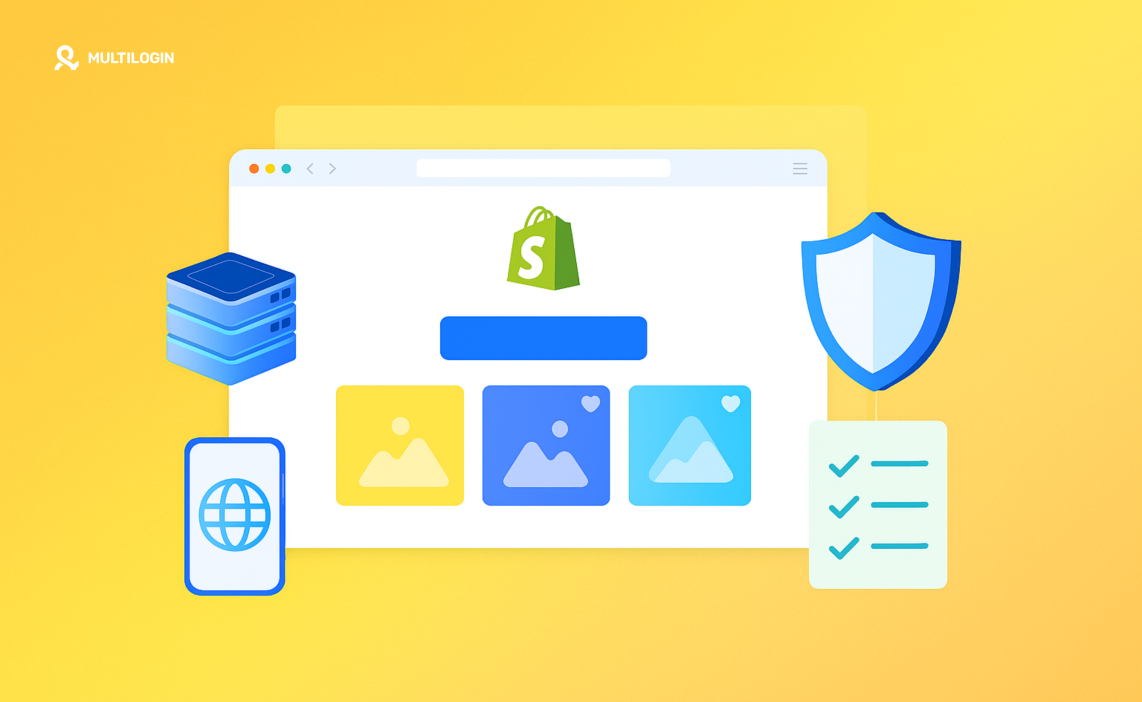Running multiple Shopify stores has become standard practice for serious e-commerce entrepreneurs. Whether you’re testing different niches, targeting various geographic markets, or building a portfolio of specialized brands, having multiple storefronts isn’t just smart—it’s often necessary for sustainable growth.
The challenge? Shopify’s terms of service technically limit you to one store per account, and their systems are designed to detect when the same person operates multiple stores. Get flagged, and you risk losing not just one store—but your entire e-commerce empire.
This is where antidetect browsers become essential. These specialized tools create unique digital fingerprints for each store, making it virtually impossible for Shopify or payment processors to connect your operations. However, choosing the wrong antidetect solution can be just as risky as not using one at all.
Ready to discover which antidetect browsers actually work for Shopify operations in 2025? Let’s explore the top 10 solutions that professional store owners trust. Start your Multilogin plan to see why it’s the industry standard for multi-store management.
Why Managing Multiple Shopify Stores Is More Complex Than You Think
Before diving into solutions, you need to understand exactly what you’re up against when running multiple Shopify stores.
Shopify’s Detection Arsenal
Shopify doesn’t just track your IP address. Their systems analyze dozens of data points to identify store connections, including:
- Browser fingerprints combining canvas, WebGL, and audio context
- Payment processor information (Shopify Payments, PayPal, Stripe)
- Bank account and credit card details
- Shipping address patterns
- Email domain connections
- Phone number verification
- Login behavior and session patterns
When you manage multiple stores from the same computer, all these data points converge. Even if you use different IP addresses, Shopify’s algorithms can still detect that the same person operates multiple stores.
The Payment Processor Problem
Here’s what many store owners miss: Even if you fool Shopify’s detection, payment processors maintain their own sophisticated tracking systems. PayPal, Stripe, and Shopify Payments all flag accounts that show suspicious patterns.
They analyze:
- Device fingerprints during checkout
- Browser characteristics
- Connection patterns
- Transaction behavior
- Risk scoring algorithms
This is why managing multiple Shopify stores requires comprehensive protection—you’re not just dealing with one platform’s detection systems.
Beyond VPNs and Proxies
Many beginners assume a VPN or proxy service will solve their problems. Unfortunately, IP masking is merely the tip of the iceberg. Even with different IP addresses, platforms can detect account connections through:
- Identical canvas fingerprints
- WebGL renderer signatures
- Timezone and language inconsistencies
- Browser extension patterns
- Font enumeration data
- Screen resolution matches
Professional antidetect browser technology addresses all these vectors simultaneously, creating truly isolated browsing environments for each store.
Essential Features for Shopify Store Management
Not every antidetect browser is suitable for managing Shopify stores. Here’s what separates professional solutions from amateur tools:
Comprehensive Fingerprint Protection
Your antidetect browser must spoof all major fingerprinting vectors. This includes canvas fingerprinting, WebGL parameters, audio context, client rects, fonts, and the dozens of other data points that Shopify tracks. Anything less creates detectable patterns.
Reliable Profile Management
Managing multiple stores means juggling numerous browser profiles simultaneously. You need a solution that offers:
- Quick switching between stores without logging out
- Persistent sessions that remember your login state
- Bulk profile creation for scaling operations
- Profile templates for consistent setup
The best solutions allow unlimited profiles, though most store owners operate 5-15 stores depending on their management capacity.
Enterprise-Grade Proxy Integration
Quality residential proxies are non-negotiable for Shopify operations. Your antidetect browser should either include proxies or integrate seamlessly with third-party providers.
Moreover, proxies should match your target market geography. If you’re running stores targeting US customers, you need US-based residential IPs. Geographic mismatch is a common detection vector that many sellers overlook.
Team Collaboration Without Compromise
As your operation grows, you’ll need to delegate tasks to virtual assistants, customer service representatives, or business partners. Your antidetect browser should offer secure profile sharing that maintains separation while enabling collaboration.
Look for solutions with role-based permissions, activity logging, and secure credential management. Multilogin’s unlimited team seats make this particularly seamless.
Payment Integration Support
Shopify stores require frequent interaction with payment dashboards, Shopify Payments settings, and third-party payment processors. Your antidetect browser needs to handle these platforms flawlessly while maintaining fingerprint consistency.
Some antidetect browsers struggle with payment processor verification flows, creating friction in your daily operations. Professional solutions ensure smooth interaction with all major payment platforms.
The Top 10 Antidetect Browsers for Shopify Store Owners
1. Multilogin – The Industry Standard for Multi-Store Operations
When professional Shopify store owners need bulletproof protection, they choose Multilogin. Unlike competitors that modify existing browsers, Multilogin built two proprietary browsers from the ground up: Mimic (Chromium-based) and Stealthfox (Firefox-based).
Why Multilogin Excels for Shopify:
Multilogin’s approach to fingerprint protection isn’t reactive—it’s proactive. The platform conducts daily testing against Shopify and major payment processors, ensuring your profiles remain undetectable even when these systems update their tracking methods.
The built-in residential proxies eliminate one of the biggest headaches for multi-store operators: managing separate proxy subscriptions. You get instant access to high-quality residential IPs from 190+ countries, with automatic rotation and session persistence.
Perhaps most valuable for growing operations: Multilogin includes unlimited team seats on all plans. When you’re ready to hire virtual assistants or bring on partners, you won’t face additional per-seat charges that competitors levy.
Key Features:
- Two proprietary browser engines (Mimic and Stealthfox)
- Built-in residential proxies with global coverage
- Pre-farmed cookies for instant account warmup
- Unlimited team member accounts
- 24/7 support in five languages
- Advanced fingerprint masking across all vectors
- API access for automation
Pricing: Starting at €5.85/month (annual billing)
Best For: Serious store owners managing 3+ Shopify stores, agencies, and scaling operations
Start your Multilogin plan and experience professional-grade protection.
2. Kameleo
Kameleo brings strong mobile emulation to the table, which can be valuable for testing mobile shopping experiences. However, it’s a mixed bag for dedicated Shopify operations.
Strengths:
- Excellent mobile device emulation
- Android app available for mobile management
- Good fingerprint randomization
- Unlimited profiles on paid plans
Limitations:
- Expensive for solo store owners
- No built-in proxies
- Team collaboration is basic
- Steeper learning curve
Pricing: Starting at €59/month
Best For: Store owners heavily focused on mobile commerce optimization
Compare features in our Multilogin vs Kameleo guide.
3. Incogniton
Incogniton attracts beginners with its free tier, offering 10 profiles at no cost. While this sounds appealing, the free version lacks critical features needed for serious Shopify operations.
Strengths:
- Free plan includes 10 profiles
- Straightforward interface
- Bulk profile creation
- Basic automation tools
Limitations:
- Free plan severely limited
- Fingerprint protection is rudimentary
- Limited proxy integration
- Sophisticated platforms can detect profiles
Pricing: Free for 10 profiles; paid plans from $29.99/month
Best For: Complete beginners experimenting with their first 2-3 stores
See our Multilogin vs Incogniton comparison for details.
4. VMLogin
VMLogin positions itself as an enterprise solution with pricing to match. While it offers robust features, the value proposition is questionable compared to more affordable alternatives with similar capabilities.
Strengths:
- Strong fingerprint protection
- Comprehensive automation via API
- Good team collaboration features
- Regular security updates
Limitations:
- Expensive entry point
- Complex interface with steep learning curve
- Limited built-in proxy options
- Overkill for small-scale operations
Pricing: Starting at $99/month
Best For: Large agencies managing 50+ stores with dedicated technical teams
Explore alternatives in our best VMLogin alternatives guide.
5. Octo Browser
Octo Browser has emerged as a mid-tier option for store owners who need more than basic protection but aren’t ready for top-tier pricing. It shows promise but still has limitations.
Strengths:
- Solid fingerprint protection
- Intuitive profile management
- Competitive pricing
- Growing feature set
Limitations:
- Smaller user community means fewer resources
- Automation capabilities are basic
- Proxy selection could be better
- Support response times vary
Pricing: Starting at $29/month
Best For: Mid-scale operators managing 5-15 stores
Learn more in our Multilogin vs Octo Browser analysis.
6. AdsPower
AdsPower has gained traction among e-commerce sellers, offering a solid middle-ground solution for store owners who need reliable protection without enterprise-level costs.
Strengths:
- User-friendly interface ideal for beginners
- Decent automation capabilities
- Reasonable pricing structure
- Good for stores targeting Asian markets
Limitations:
- Fingerprint protection isn’t as advanced as Multilogin
- Team features limited on lower tiers
- Proxy management can be cumbersome
- Updates lag behind platform detection changes
Pricing: Free plan available; paid plans from $9/month
Best For: Solo entrepreneurs managing 2-5 stores with moderate technical skill
Check our Multilogin vs AdsPower comparison for detailed analysis.
7. GoLogin
GoLogin markets itself as an affordable antidetect solution for store owners who need basic protection on a budget. Recent updates have improved its capabilities, though gaps remain compared to premium alternatives.
Strengths:
- Affordable entry-level pricing
- Cloud profiles for remote access
- Improving fingerprint protection
- Growing user community
Limitations:
- Limited advanced fingerprinting parameters
- Proxy quality varies significantly
- Team collaboration requires higher plans
- Can struggle with payment processor verification
Pricing: Starting at $24/month
Best For: New store owners testing multi-store strategies with 2-4 stores
Read our Multilogin vs GoLogin analysis for more insights.
8. Dolphin Anty
Originally designed for cryptocurrency and affiliate marketing, Dolphin Anty has attracted some Shopify store owners seeking free or low-cost solutions. However, its design priorities don’t always align with e-commerce needs.
Strengths:
- Free plan for up to 10 profiles
- Active development and updates
- Good proxy integration options
- Useful automation features
Limitations:
- E-commerce features are secondary
- Fingerprint protection has occasional gaps
- Team features require paid upgrades
- Customer support primarily focuses on crypto/affiliate use cases
Pricing: Free for 10 profiles; paid plans from $89/month
Best For: Store owners who also run crypto or affiliate operations and need cross-platform functionality
9. MoreLogin
MoreLogin offers budget-friendly plans with an emphasis on team collaboration. While the pricing is attractive, the platform lacks the depth needed for professional Shopify operations.
Strengths:
- Affordable team plans
- Clean interface
- Basic automation features
- Free trial available
Limitations:
- Fingerprint protection is average at best
- Proxy integration is clunky
- Performance can be inconsistent
- Feature updates are infrequent
Pricing: Starting at $9/month
Best For: Small teams on tight budgets managing 3-8 stores
Compare in our Multilogin vs MoreLogin guide.
10. Undetectable
Undetectable takes a cloud-based approach to profile management, which can benefit remote teams. However, this architecture comes with trade-offs for Shopify operations.
Strengths:
- Cloud-based profiles accessible anywhere
- Good for distributed teams
- Reasonable pricing structure
- Decent core fingerprint protection
Limitations:
- Requires stable internet connection
- Limited offline functionality
- E-commerce-specific features are basic
- Smaller overall feature set
Pricing: Starting at $49/month
Best For: Remote teams needing flexible cloud access
Check our Multilogin vs Undetectable comparison for full details.
Setting Up Your Multi-Store Operation for Success
Choosing the right antidetect browser is crucial, but it’s just one component of a successful multi-store strategy. Here’s how to build a sustainable operation:
Geographic Specialization Strategy
Instead of running multiple stores targeting the same market, consider geographic specialization. Create dedicated stores for different regions:
- United States store with USD pricing
- European Union store with EUR pricing and GDPR compliance
- United Kingdom store with GBP pricing
- Australia/New Zealand store with localized shipping
- Canadian store with CAD pricing
This approach allows you to optimize each store for local preferences, payment methods, and shipping expectations. Use your antidetect browser to maintain authentic local fingerprints—matching timezone, language, and browsing patterns to each target market.
Niche Separation Approach
Many successful Shopify operators run multiple stores specializing in different product categories:
- High-ticket luxury goods store
- Budget-friendly everyday items store
- Niche hobby equipment store
- Seasonal products store
This strategy reduces risk if one niche becomes saturated or loses profitability. Each store can build specialized expertise and brand identity without conflicting with your other operations.
Brand Portfolio Model
Build a portfolio of distinct brands, each with its own identity, target audience, and market positioning. This approach allows you to:
- Test different branding strategies
- Appeal to different customer demographics
- Build valuable intellectual property
- Create exit opportunities for individual brands
Your antidetect browser keeps each brand’s operations completely isolated, preventing cross-contamination that could reveal common ownership.
👉 Don’t risk bans: Try Multilogin and keep your accounts undetected.
Frequently Asked Questions About Antidetect Browsers for Shopify Stores
Technically, there’s no limit with proper antidetect technology. However, operational capacity is the real constraint. Most solo entrepreneurs effectively manage 3-7 stores, while teams can handle 20-50+ depending on resources and systems. Multilogin supports unlimited profiles, so technology won’t limit your growth.
Yes, absolutely. Each store should operate through unique residential proxies from appropriate geographic locations. Multilogin’s built-in residential proxies handle this automatically. If using other solutions, budget for quality residential proxies—avoid cheap datacenter IPs that payment processors flag instantly.
Yes, with proper setup. Multilogin allows you to share specific browser profiles with team members without compromising security. Each VA logs into their own Multilogin account and accesses only the profiles you’ve shared. This maintains fingerprint consistency while enabling delegation.
Free antidetect browsers typically offer basic protection that sophisticated platforms like Shopify and major payment processors can detect. Given that each store represents thousands in potential monthly revenue, investing €5.85/month in professional protection is sound business logic. One detected store can cost far more than years of Multilogin subscriptions.
Conclusion: Building a Sustainable Multi-Store Empire
Managing multiple Shopify stores isn’t about circumventing rules—it’s about building diversified, resilient e-commerce operations that can weather market changes, niche saturation, and platform policy shifts.
The right antidetect browser transforms multi-store management from a risky venture into a professional business strategy. While several options exist in the market, Multilogin consistently delivers the combination of advanced fingerprint protection, operational convenience, and reliable performance that serious store owners require.
At €5.85/month, Multilogin costs less than the profit from a single sale while protecting thousands in monthly revenue across your store portfolio. The question isn’t whether you can afford professional protection—it’s whether you can afford to operate without it.
Ready to scale your Shopify operations safely and sustainably? Start your 10-day Multilogin trial and experience the difference that professional-grade antidetect technology makes for your multi-store empire.
For store owners serious about building sustainable, growing e-commerce businesses, proper protection isn’t optional—it’s the foundation of everything you’ll build. Choose wisely from day one, and set yourself up for long-term success across multiple stores and markets.



